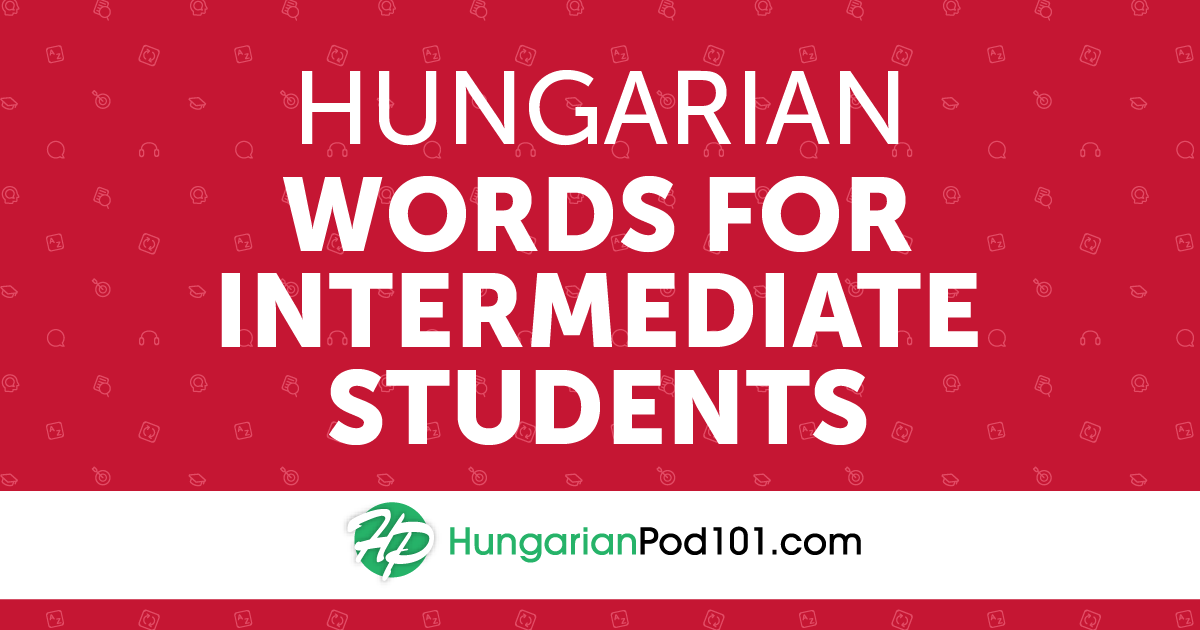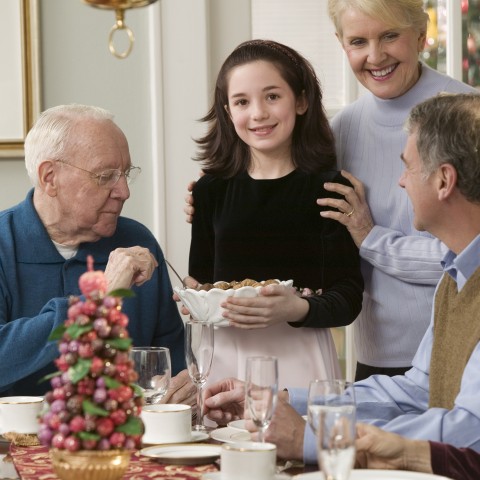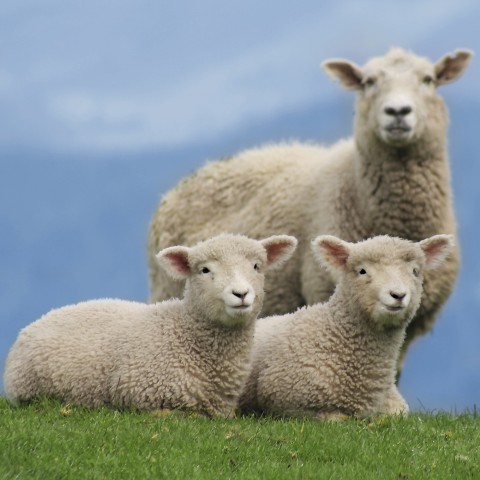
In a previous article, we covered the top Hungarian words for beginners in order to lay out a solid foundation for new learners. But if you’ve been learning with us for a while, you might be ready to push past the beginner stuff into new and exciting territory.
To give you a headstart, HungarianPod101 has compiled this list of háromszáz (300) intermediate Hungarian words you can start practicing right away. This article is geared toward learners who already have a basic knowledge of Hungarian and who have become familiar with the most basic words.
We’ve categorized our list based on the part of speech and theme. Keep in mind that most of these words are at the lower-intermediate level, though you might find a couple of more advanced words as well.
Remember: If you find this article too challenging (or not challenging enough), you can explore HungarianPod101.com to find more suitable learning materials for your current level and preferences. Struggling to find the right fit? Feel free to reach out to our team, and we’d be glad to help you find the best lessons and materials for your goals.
So, are you ready to learn the most useful intermediate Hungarian words now? Awesome! Let’s go.

 Table of Contents
Table of Contents
- Larger Numbers
- Nouns
- Verbs
- Adjectives
- Adverbs
- Prepositions
- Conjunctions
- Auxiliary Words and Particles
- How HungarianPod101.com Can Help You Reach Your Hungarian Learning Goals
1. Larger Numbers
In our article on beginner words, you got to know the numbers 1-10 in Hungarian (“zero” is nulla, in case you’re wondering). Now it’s time for you to learn the larger numbers, starting from 11 and going up to the millions and billions!
Keep in mind that, in Hungary, our currency is the HUF (not the EUR). As such, it’s perfectly reasonable for the price of a pair of shoes, for example, to be in the tens of thousands of HUF—yes, you read that right. This makes larger numbers a crucial element to add to your intermediate Hungarian vocabulary, as you’ll likely need to know and use them on a regular basis.
One important thing we should mention is that while English uses a hyphen for the numbers 21-99, Hungarian only uses them from 2,000 onwards. Let’s see how this works.
Numbers 11-20
“Eleven” – Tizenegy “Sixteen” – Tizenhat
“Twelve” – Tizenkettő “Seventeen” – Tizenhét
“Thirteen” – Tizenhárom “Eighteen” – Tizennyolc
“Fourteen” – Tizennégy “Nineteen” – Tizenkilenc
“Fifteen” – Tizenöt “Twenty” – Húsz
Numbers 30-100
“Thirty” – Harminc “Seventy” – Hetven
“Forty” – Negyven “Eighty” – Nyolcvan
“Fifty” – Ötven “Ninety” – Kilencven
“Sixty” – Hatvan “Hundred” – Száz
Wondering how to form numbers like 21 and 45 in Hungarian? It’s simple! All you have to do is place the appropriate number from 1 to 9 after the appropriate “tens” word. For example:
- “Twenty-one” – Huszonegy
- “Forty-five” – Negyvenöt
Just like in English!
The Hundreds
“Two hundred” – Kétszáz “Eight hundred” – Nyolcszáz
“Six hundred” – Hatszáz “Nine hundred” – Kilencszáz
Again, to form the numbers in-between the round hundreds, you just need to place the appropriate number 1-99 after the appropriate “hundreds” word.
- “Two hundred and four” – Kétszáznégy
- “Two hundred and fourteen” – Kétszáztizennégy
Even Bigger Numbers
While English does not use hyphens above 99, Hungarian uses them for all numbers above 2,000 that are not round thousands (such as 3,000 or 10,000). See below.
“Thousand” – Ezer
“Seven thousand and seventy-nine” – Hétezer-hetvenkilenc (7,079)
“Ten thousand” – Tízezer
“Eighty thousand, two hundred and forty-three” – Nyolcvanezer-kétszáznegyvenhárom (80,243)
“One million” – Egymillió
“Seven million, four hundred and ninety thousand, five hundred and thirty” – Hétmillió-négyszázkilencvenezer-ötszázharminc (7,490,530)
“Twelve billion” – Tizenkétmilliárd
“Two billion, six hundred and eighty-five million, three hundred and twenty thousand, four hundred and two” – Kétmilliárd-hatszáznyolcvanötmillió-háromszázhúszezer-négyszázkettő (2,685,320,402)

2. Nouns
Nouns are an essential component of every language because no sentence is complete without them.
At this point in your language learning journey, you probably know a variety of beginner-level nouns and can comfortably use them in your daily conversations. But if you’re ready to branch out and begin talking about more complex topics than your morning routine or pets, you’ll need to learn some practical intermediate-level Hungarian nouns.
We’ve tried to include a diverse selection of nouns for you to study, but you can also check out our Lower Intermediate course or reach out to your teacher if you’d like to learn more.
Family
“Mother-in-law” – Anyós “Stepsister” – Mostohatestvér (lány)
“Father-in-law” – Após “Stepbrother” – Mostohatestvér (fiú)
“Daughter-in-law” – Meny “Stepmother” – Mostohaanya
“Son-in-law” – Vő “Stepfather” – Mostohaapa
“Niece” – Unokahúg “Half-sister” – Féltestvér (lány)
“Nephew” – Unokaöccs “Half-brother” – Féltestvér (fiú)
“Nuclear family” – Kiscsalád “Childhood” – Gyerekkor
“Extended family” – Nagycsalád “Adolescence” – Kamaszkor / Serdülőkor
“Foster family” – Nevelőcsalád “Adolescent” – Kamasz / Serdülő
“Single-parent family” – Csonkacsalád “Adulthood” – Felnőttkor
Work
“Surgeon” – Sebész “Resignation letter” – Felmondólevél
“Detective” – Nyomozó “Contract” – Szerződés
“Accountant” – Könyvelő “Interview” – Interjú
“Linguist” –Nyelvész “Employee” – Alkalmazott / Munkavállaló
“Astronaut” –Asztronauta, űrhajós “Occupation” – Foglalkozás
In and Around the City
“City hall” – Városháza “Railway station” – Vasútállomás
“Courthouse” – Bíróság “Airport” – Repülőtér
“Penitentiary” – Javítóintézet “Taxi stand” – Taxiállomás
“Private clinic” – Magánklinika “Amusement park” – Vidámpark
“Hypermarket” – Hipermarket “Subway station” – Metróállomás
“Telephone box” – Telefonfülke “Sports center” – Sportközpont / Sportcenter“
Cycle path” – Bicikliút “Gas station” – Benzinkút

Office Essentials
“Paper clip” – Gémkapocs “Scissors” – Olló
“Correction fluid” – Hibajavító “Hole punch” – Lyukasztó
“Envelope” – Boríték “Wastebasket” – Szemeteskosár
“Pushpin” – Rajzszög “Stamp” – Pecsét
“Calculator” – Számológép “Magnifier” – Nagyító
Animals
“Giraffe” – Zsiráf “Stallion” – Csődör
“Gazelle” – Gazella “Sow” – Anyakoca / Anyasertés
“Elephant” – Elefánt “Piglet” – Kismalac
“Lion” – Oroszlán “Goat” – Bakkecske
“Hippopotamus” – Víziló “Billygoat” – Bakkecske
“Blue whale” – Kékbálna “Sheep” – Bárány
“Coyote” – Prérifarkas “Ram” – Kos
“Ostrich” – Strucc “Goose” – Lúd
“Tortoise” – Teknősbéka “Rooster” – Kakas
“Polar bear” – Jegesmedve “Fox” – Róka
Fruits, Vegetables & More
“Apple” – Alma “Plum” – Szilva
“Green apple” – Zöldalma “Passion fruit” – Maracuja
“Peach” – Őszibarack “Cherry” – Cseresznye
“Blackberry” – Szeder “Sour cherry” – Meggy
“Fig” – Füge “Melon” – Sárgadinnye
“Cauliflower” – Karfiol “Spinach” – Spenót
“Zucchini” – Cukkini “Arugula” – Rukkola
“Brussels sprouts” – Kelbimbó “Broccoli” – Brokkoli
“Asparagus” – Spárga “Cucumber” – Uborka
“Sweet potato” – Édesburgonya “Mushroom” – Gomba

3. Verbs
Like nouns, verbs are crucial in any language. Learning the intermediate Hungarian verbs listed below will allow you to build upon the vocabulary you learned in our beginner words article, and we’ve hand-picked those verbs you’re most likely to use on a regular basis.
Work
Would you like to be able to tell your colleagues how you get to work? Check out our vocabulary list for means of transportation in Hungarian.
“To present” – Prezentálni “To manage” – Kezelni
“To operate” – Működtetni “To invest” – Befektetni
“To call” – Hívni “To reward” – Jutalmazni
“To arrange” – Megszervezni “To contribute” – Hozzájárulni
“To type” – Gépelni “To write” – Írni
“To manage” – Kezelni “To join” – Csatlakozni
“To cancel” – Lemondani “To burn out” – Kiégni
“To hand in” – Leadni “To carry out” – Kivitelezni
“To take on” – Felvenni valakit “To create” – Készíteni
“To fill out” – Kitölteni “To pay” – Fizetni
Emotions
“To love” – Szeretni “To detest” – Gyűlölni
“To like” – Kedvelni “To pity” – Sajnálni
“To admire” – Csodálni “To crave” – Áhítozni
“To envy” – Irigyelni “To desire” – Kívánni
“To hate” – Utálni “To mourn” – Gyászolni
“To tire” – Fárasztani “To bore” – Untatni

4. Adjectives
With adjectives, we’re able to describe the world around us. As an intermediate Hungarian learner, you are capable of learning and remembering more complex adjectives, which will allow you to describe objects and feelings more accurately.
In the lists below, you’ll find intermediate Hungarian words on a range of topics, including patterns, personalities, and emotions.
Patterns
“Floral” – Virágos “Spotted” – Foltos
“Checkered” – Pepita “Dotted” – Pöttyös
“Striped” – Csíkos “Plaid” – Kockás
“Wavy” – Hullámos “Paisley” – Kasmírmintás
“Abstract” – Absztrakt “Tartan” – Skótkockás
Describing Objects
“Wide” – Széles “Spiky” – Szúrós
“Narrow” – Keskeny “Flat” – Tompa
“Rugged” – Érdes “Oval” – Ovális
“Wooden” – Fa “Round” – Gömbölyű
“Metal” – Fém “Smooth” – Sima
Describing People
“Cold” – Rideg “Laidback” – Laza
“Optimistic” – Optimista “Pessimistic” – Pesszimista
“Evil” – Gonosz “Shy” – Félénk
“Good-natured” – Jóindulatú “Pathetic” – Szánalmas
“Sweet” – Aranyos “Humble” – Szerény
“Creative” – Kreatív “Dramatic” – Drámai
“Hardworking” – Szorgalmas “Attractive” – Vonzó
“Honest” – Őszinte “Caring” – Törődő
“Friendly” – Barátságos “Discreet” – Diszkrét
“Calm” – Nyugodt “Generous” – Nagyvonalú
Describing Emotions
As social creatures, we like expressing our emotions to others. This list of intermediate Hungarian words will get you started off on the right foot.
“Proud” – Büszke “Surprised” – Meglepett
“Confused” – Zavarodott “Confident” – Magabiztos
“Lonely” – Magányos “Excited” – Izgatott
“Frightened” – Rémült “Jealous” – Féltékeny
“Amused” – Szórakozott “Bored” – Unott
Describing the Weather
“Snowy” – Havas “Sleety” – Havas esős
“Bright” – Világos “Showery” – Zivataros
“Misty” – Ködös “Hailing” – Jégesős
“Freezing” – Fagyos “Gloomy” – Szomorkás

5. Adverbs
Adverbs are words that present additional information about a verb, adjective, or another adverb. These words may not be as vital to the language as nouns and verbs, for instance, but adding them to your intermediate Hungarian vocabulary bank will allow you to more aptly describe the context of actions, states of being, and more.
Manner
“Thoroughly” – Alaposan “Honestly” – Őszintén
“Thankfully” – Hálásan “Clumsily” – Ügyetlenül
“Casually” – Átlagosan “Cleverly” – Ügyesen
“Bravely” – Bátran “Ruthlessly” – Könyörtelenül
“Loudly” – Hangosan “Cruelly” – Gonoszan
“Angrily” – Haragosan “Passionately” – Szenvedélyesen
“Easily” – Könnyedén “Uncertainly” – Bizonytalanul
“Gently” – Gyengéden “Quickly” – Gyorsan
“Happily” – Boldogan “Dramatically” – Drámaian
“Sadly” – Szomorúan “Playfully” – Játékosan
Time
“So far” – Eddig “Rarely” – Ritkán
“Lately” – Az utóbbi időben “Regularly” – Gyakran
“Recently” – Mostanában “Yet” – Még / Már
“Annually” – Évente “Seldom” – Néha
“Early” – Korán “Never” – Soha
“Usually” – Általában “Constantly” – Folyamatosan
“Monthly” – Havonta “Before” – Azelőtt
“Daily” – Naponta “Soon” – Hamar(osan)
“Formerly” – Előzőleg “Already” – Már
“Last” – Utoljára
Place
“Everywhere” – Mindenhol “East” – Keletre
“Nowhere” – Sehol “Somewhere” – Valahol
“Here” – Itt “Along” – Végig
“There” – Ott “Next door” – A szomszédban
“Abroad” – Külföldön “Upstairs” – Fent az emeleten
“Indoors” – Bent “Downstairs” – Lent a földszinten
“Outdoors” – Kint “Near” – Közel
“Down” – Lent “Towards” – Felé
“Right” – Jobbra “Back” – Hátul
“Left” – Balra “Front” – Elöl

6. Prepositions
Prepositions are words (or sometimes affixes, in the case of Hungarian) that express the relationship between two elements of a clause or sentence. Keep in mind that many of the prepositional prefixes listed below have a counterpart in English.
“Around” – Körül “Through” – Át-
“In” – Be- “Out” – Ki-
“On” – Rá- “Above” – Felett
“Under” – Alatt “Up” – Fel-
“Behind” – Mögött “Down” – Le-
“Next to” – Mellett “Away” – El-
“Between” – Között “Apart” – Szét-
“Opposite” – Szemben “At” – -nál / -nél
“Below” – Alatt “With” – -val / -vel
“Into” – Bele- “Within” – Belül
7. Conjunctions
Conjunctions link together two words or phrases (and sometimes even sentences). In our beginner words article, we introduced you to a few of the simpler ones; this time, we’ll show you the most useful intermediate Hungarian conjunctions!
“Accordingly” – Aszerint “Consequently” – Következtetésképpen
“Actually” – Igazából “For example” – Például
“Nevertheless” – Mindamellett “For this reason” – Ezen okból
“Nonetheless” – Mindazonáltal “From here on” – Innentől kezdve
“Moreover” – Sőt “To begin with” – Először is
“However” – Habár “With this in mind” – Ennek következtében
“Although” – Bár “Such as” – Úgy mint
“Besides” – Emellett “Similarly” – Hasonlóképpen
“Nor” – Sem “In contrast” – Ezzel szemben
“Therefore” – Ennélfogva “Hence” – Így
“Third” – Harmadjára “In conclusion” – Összefoglalásképp
“Thus” – Tehát “In the meantime” – Időközben
“Whereas” – Míg “To be specific” – Konkrétumként
“Yet” – Márpedig “To illustrate” – Szemléltetésképpen
“Further” – Továbbá “As a result” – Eredményképp
“Afterwards” – Azontúl “Equally important” – Hasonló fontossággal

8. Auxiliary Words and Particles
Lastly, let’s see some intermediate Hungarian auxiliary words.
“Be” – Lenni “Would” – -ná/-né
“I am your mother.” – “Would you tell me?” –
Az édesanyád vagyok. Elmondanád nekem?
“Need” – Kell / Szükséges “Mustn’t” – Tilos
“I need to buy bread.” – “You mustn’t say yes.” –
Kenyeret kell vennem. Tilos igent mondanod.
9. How HungarianPod101.com Can Help You Reach Your Hungarian Learning Goals
If you’ve made it this far, it means that you now know the most common intermediate Hungarian words. You’re now well-equipped to talk about a variety of topics: work, animals, emotions, and the list goes on… As always, feel free to reach out to us with any questions you might still have.
- → To continue improving your ability to speak and understand Hungarian at the intermediate level, we recommend checking out our Lower Intermediate Hungarian course!
If you’re thirsty for more, don’t hesitate to contact us or browse our website. The easiest way to perfect your Hungarian language skills is by joining HungarianPod101, where the fun and study materials are endless.
If you sign up today, you’ll gain access to blog posts, audio files, video lessons, and much more. We have materials and lessons available for learners at every level, and our team is always ready to help you out and be your biggest cheerleader!
So, what are you waiting for? Join now.












